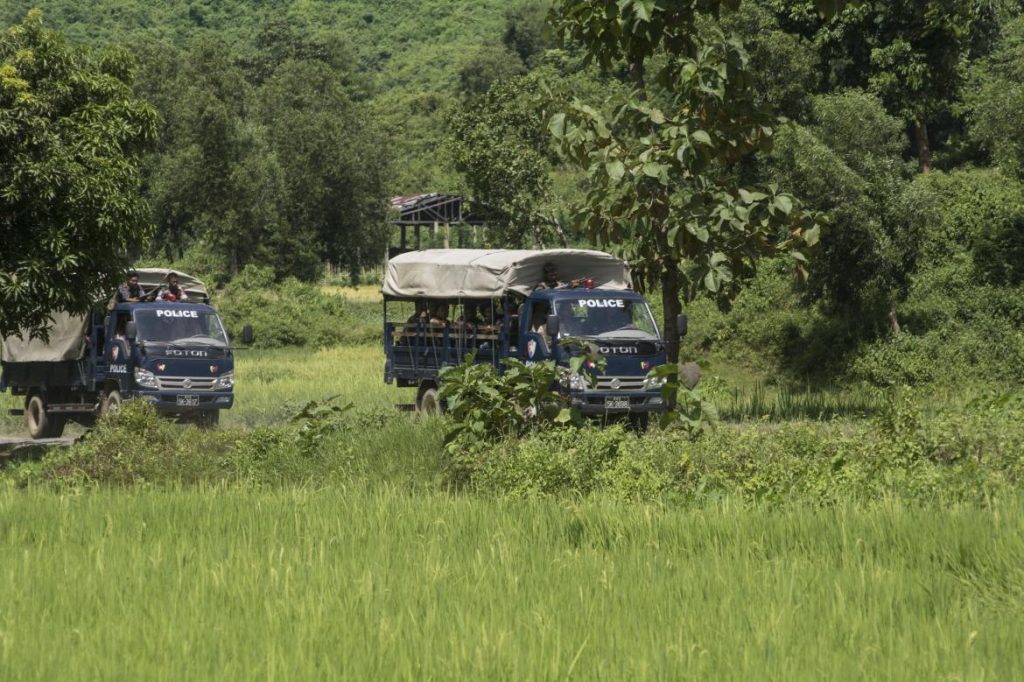By AFP
YANGON — At least 71 people have been killed, including 12 members of the police and military, after Rohingya militants attacked remote border posts in Rakhine State on Friday, according to the office of State Counsellor Daw Aung San Suu Kyi.
It is the worst outbreak of violence for months in Rakhine State, coming only days after a milestone report by a commission led by former UN chief Kofi Annan urging immediate action to heal the divide.
In an updated toll, the State Counsellor’s office said 12 security officials had been killed and that “59 dead bodies of extremist Bengali terrorists” had been found — the phrase Myanmar authorities use to describe Rohingya militants
Around two dozen police posts came under attack by an estimated 150 militants in the early hours of Friday, prompting soldiers to fight back, the statement issued by the State Counsellor’s office said.
Support more independent journalism like this. Sign up to be a Frontier member.
“Many police posts and stations were attacked,” said Aung San Suu Kyi’s office, in at least one case using homemade mines.
Confirming the unrest, a police officer in Buthidaung town, close to the worst violence, said border guard posts remained surrounded by militants as day broke in a fluid and dangerous flare up of violence.
“The situation is complicated… the military is arriving,” the officer told AFP on condition of anonymity, adding some of the attackers were armed with guns.
State MP U Maung Ohn (Arakan National Party, Maungdaw-2), said that insurgents had besieged Kyauk Pandu village, and clashes were continuing.
A Twitter account purporting to represent the Arakan Rohingya Salvation Army, which claims to lead an insurgency based in the Mayu mountain range, took responsibility for the attacks on Friday morning.
“This is a legitimate step for us to defend the world’s persecuted people and liberate the oppressed people from the hands of the oppressors,” the account wrote.
Recent tensions have flared further after several Buddhists were found dead, prompting some ethnic Rakhine villagers to flee.
Violence after Annan report
The flare up came just hours after former UN chief Kofi Annan released a milestone report detailing conditions inside Rakhine and offering ways to heal the festering sectarian tensions there.
Commissioned by Myanmar’s own government, it urged the scrapping of restrictions of movement and citizenship imposed on the roughly one million-strong Rohingya community in Rakhine.
In a statement Annan said he was “gravely concerned” by the latest outbreak of fighting.
“The alleged scale and gravity of these attacks mark a worrying escalation of violence,” he said.
“After years of insecurity and instability, it should be clear that violence is not the solution to the challenges facing Rakhine State,” he added.
The wedge of Rakhine closest to Bangladesh has been in lockdown since October 2016.
Deadly attacks by the militants on border police sparked a military response that left scores dead and forced tens of thousands to flee to Bangladesh.
The UN believes those security ‘clearances’ may have amounted to ethnic cleansing of the Rohingya, a mainly Muslim minority living in Buddhist Myanmar.
The army and Aung San Suu Kyi’s civilian government vehemently deny allegations of widespread abuses, including rapes and murders.
They have so far refused to grant visas to UN investigators tasked with probing the allegations.
Myanmar security forces have conducted sporadic operations to flush out suspected militants throughout this year, often resulting in casualties among Rohingya villagers.
They have spoken of their fear at being trapped in between security forces and the militants, who are accused of conducting a shadowy assassination campaign against perceived collaborators with the state.
Access to the area is severely restricted and verifying information is difficult.
Additional reporting by Frontier.







